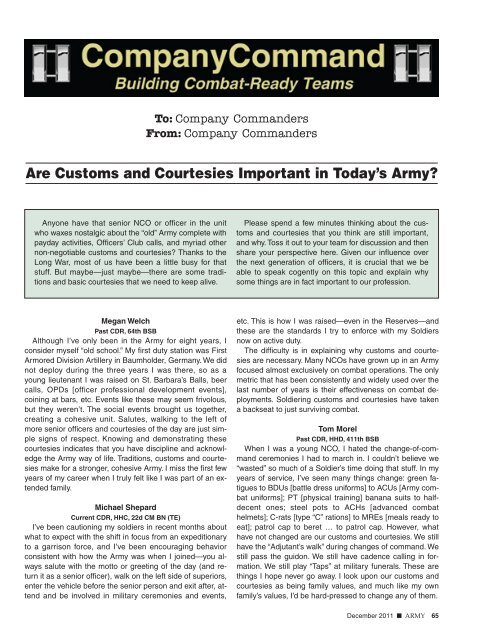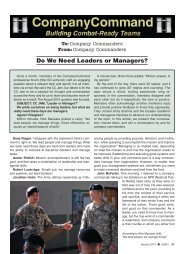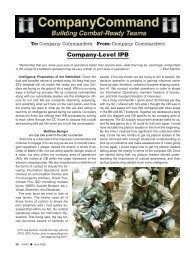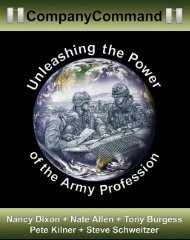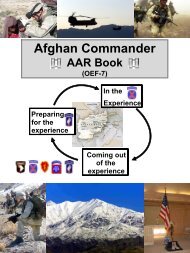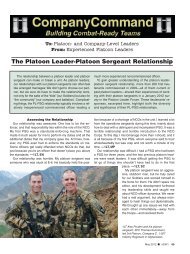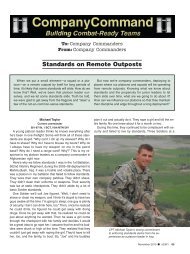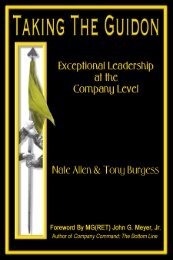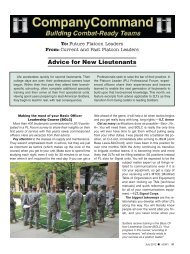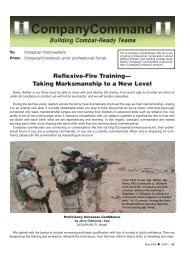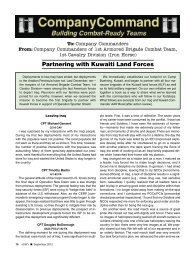Are Customs and Courtesies Important in Today's Army?
Are Customs and Courtesies Important in Today's Army?
Are Customs and Courtesies Important in Today's Army?
Create successful ePaper yourself
Turn your PDF publications into a flip-book with our unique Google optimized e-Paper software.
To: Company Comm<strong>and</strong>ers<br />
From: Company Comm<strong>and</strong>ers<br />
<strong>Are</strong> <strong>Customs</strong> <strong>and</strong> <strong>Courtesies</strong> <strong>Important</strong> <strong>in</strong> Today’s <strong>Army</strong><br />
Anyone have that senior NCO or officer <strong>in</strong> the unit<br />
who waxes nostalgic about the “old” <strong>Army</strong> complete with<br />
payday activities, Officers’ Club calls, <strong>and</strong> myriad other<br />
non-negotiable customs <strong>and</strong> courtesies Thanks to the<br />
Long War, most of us have been a little busy for that<br />
stuff. But maybe—just maybe—there are some traditions<br />
<strong>and</strong> basic courtesies that we need to keep alive.<br />
Please spend a few m<strong>in</strong>utes th<strong>in</strong>k<strong>in</strong>g about the customs<br />
<strong>and</strong> courtesies that you th<strong>in</strong>k are still important,<br />
<strong>and</strong> why. Toss it out to your team for discussion <strong>and</strong> then<br />
share your perspective here. Given our <strong>in</strong>fluence over<br />
the next generation of officers, it is crucial that we be<br />
able to speak cogently on this topic <strong>and</strong> expla<strong>in</strong> why<br />
some th<strong>in</strong>gs are <strong>in</strong> fact important to our profession.<br />
Megan Welch<br />
Past CDR, 64th BSB<br />
Although I’ve only been <strong>in</strong> the <strong>Army</strong> for eight years, I<br />
consider myself “old school.” My first duty station was First<br />
Armored Division Artillery <strong>in</strong> Baumholder, Germany. We did<br />
not deploy dur<strong>in</strong>g the three years I was there, so as a<br />
young lieutenant I was raised on St. Barbara’s Balls, beer<br />
calls, OPDs [officer professional development events],<br />
co<strong>in</strong><strong>in</strong>g at bars, etc. Events like these may seem frivolous,<br />
but they weren’t. The social events brought us together,<br />
creat<strong>in</strong>g a cohesive unit. Salutes, walk<strong>in</strong>g to the left of<br />
more senior officers <strong>and</strong> courtesies of the day are just simple<br />
signs of respect. Know<strong>in</strong>g <strong>and</strong> demonstrat<strong>in</strong>g these<br />
courtesies <strong>in</strong>dicates that you have discipl<strong>in</strong>e <strong>and</strong> acknowledge<br />
the <strong>Army</strong> way of life. Traditions, customs <strong>and</strong> courtesies<br />
make for a stronger, cohesive <strong>Army</strong>. I miss the first few<br />
years of my career when I truly felt like I was part of an extended<br />
family.<br />
Michael Shepard<br />
Current CDR, HHC, 22d CM BN (TE)<br />
I’ve been caution<strong>in</strong>g my soldiers <strong>in</strong> recent months about<br />
what to expect with the shift <strong>in</strong> focus from an expeditionary<br />
to a garrison force, <strong>and</strong> I’ve been encourag<strong>in</strong>g behavior<br />
consistent with how the <strong>Army</strong> was when I jo<strong>in</strong>ed—you always<br />
salute with the motto or greet<strong>in</strong>g of the day (<strong>and</strong> return<br />
it as a senior officer), walk on the left side of superiors,<br />
enter the vehicle before the senior person <strong>and</strong> exit after, attend<br />
<strong>and</strong> be <strong>in</strong>volved <strong>in</strong> military ceremonies <strong>and</strong> events,<br />
etc. This is how I was raised—even <strong>in</strong> the Reserves—<strong>and</strong><br />
these are the st<strong>and</strong>ards I try to enforce with my Soldiers<br />
now on active duty.<br />
The difficulty is <strong>in</strong> expla<strong>in</strong><strong>in</strong>g why customs <strong>and</strong> courtesies<br />
are necessary. Many NCOs have grown up <strong>in</strong> an <strong>Army</strong><br />
focused almost exclusively on combat operations. The only<br />
metric that has been consistently <strong>and</strong> widely used over the<br />
last number of years is their effectiveness on combat deployments.<br />
Soldier<strong>in</strong>g customs <strong>and</strong> courtesies have taken<br />
a backseat to just surviv<strong>in</strong>g combat.<br />
Tom Morel<br />
Past CDR, HHD, 411th BSB<br />
When I was a young NCO, I hated the change-of-comm<strong>and</strong><br />
ceremonies I had to march <strong>in</strong>. I couldn’t believe we<br />
“wasted” so much of a Soldier’s time do<strong>in</strong>g that stuff. In my<br />
years of service, I’ve seen many th<strong>in</strong>gs change: green fatigues<br />
to BDUs [battle dress uniforms] to ACUs [<strong>Army</strong> combat<br />
uniforms]; PT [physical tra<strong>in</strong><strong>in</strong>g] banana suits to halfdecent<br />
ones; steel pots to ACHs [advanced combat<br />
helmets]; C-rats [type “C” rations] to MREs [meals ready to<br />
eat]; patrol cap to beret … to patrol cap. However, what<br />
have not changed are our customs <strong>and</strong> courtesies. We still<br />
have the “Adjutant’s walk” dur<strong>in</strong>g changes of comm<strong>and</strong>. We<br />
still pass the guidon. We still have cadence call<strong>in</strong>g <strong>in</strong> formation.<br />
We still play “Taps” at military funerals. These are<br />
th<strong>in</strong>gs I hope never go away. I look upon our customs <strong>and</strong><br />
courtesies as be<strong>in</strong>g family values, <strong>and</strong> much like my own<br />
family’s values, I’d be hard-pressed to change any of them.<br />
December 2011 ■ ARMY 65
the right without say<strong>in</strong>g a word. The<br />
awkward looks on the juniors’ faces<br />
showed that they understood what just<br />
occurred <strong>and</strong> would likely be more<br />
aware next time. I agree that C&Cs<br />
[customs <strong>and</strong> courtesies] are a key<br />
facet to the profession, but I also th<strong>in</strong>k<br />
it’s important that we th<strong>in</strong>k about the<br />
manner <strong>in</strong> which we correct them.<br />
CPT Michael Schmidt (left), shown here with his company executive<br />
officer, 1LT Jeff O’Dell, at Camp Lybert <strong>in</strong> Nuristan Prov<strong>in</strong>ce,<br />
Afghanistan, had little opportunity to tra<strong>in</strong> military customs <strong>and</strong> courtesies<br />
there but agrees that they “are a key facet to the profession.”<br />
Alicia Chapman<br />
Current CDR, HHD, 114th Signal BN<br />
My unit is composed of military, DA [Department of the<br />
<strong>Army</strong>] civilians <strong>and</strong> contractors. As the company comm<strong>and</strong>er,<br />
I have the task of gett<strong>in</strong>g these three entities with three<br />
“different” sets of rules to work together as a cohesive unit.<br />
This is no small task <strong>and</strong> it def<strong>in</strong>itely isn’t easy, but it is a<br />
problem I have to work through. How do I enforce a s<strong>in</strong>gle<br />
st<strong>and</strong>ard for my unit when some of those st<strong>and</strong>ards cannot<br />
apply to the contractors or DA civilians It can quickly turn<br />
<strong>in</strong>to a game of “us versus them,” which is not healthy for the<br />
organization.<br />
Michael Schmidt<br />
Past CDR, C/3-71 CAV<br />
Once, when I was a lieutenant, I was<br />
walk<strong>in</strong>g on the right-h<strong>and</strong> side of a<br />
more senior officer. He grabbed me by<br />
the shoulders <strong>and</strong> moved me to his left.<br />
He didn’t say a word, <strong>and</strong> I laughed it<br />
off. (I knew better; it had slipped my<br />
m<strong>in</strong>d.) I’ve seen other examples where<br />
a group of officers com<strong>in</strong>g out of a<br />
build<strong>in</strong>g were walk<strong>in</strong>g <strong>and</strong> talk<strong>in</strong>g, juniors<br />
walk<strong>in</strong>g to the right. The senior<br />
saw this <strong>and</strong> assumed the position on<br />
Roman Izzo<br />
Past CDR, C/1-66 AR <strong>and</strong> HHT/1-10 CAV<br />
Officer’s Call (or Stable Call) is a<br />
team build<strong>in</strong>g event. Keep it.<br />
Walk<strong>in</strong>g to the left of a senior officer<br />
is more than a courtesy. It enables<br />
Soldiers to look at a group of people<br />
<strong>and</strong> immediately identify the senior<br />
person <strong>and</strong> determ<strong>in</strong>e whether or not<br />
a salute is required. Keep it.<br />
Call<strong>in</strong>g a build<strong>in</strong>g to attention <strong>in</strong>stills<br />
discipl<strong>in</strong>e. Despite the fact that we are<br />
a positive-leadership <strong>Army</strong>, it’s imperative to ma<strong>in</strong>ta<strong>in</strong> the<br />
respect for comm<strong>and</strong> that sets the conditions for <strong>in</strong>stant<br />
obedience on the battlefield. Keep it.<br />
Attend<strong>in</strong>g cha<strong>in</strong>-of-comm<strong>and</strong> receptions builds the team,<br />
community, family <strong>and</strong> officer corps. Visit<strong>in</strong>g the brigade<br />
comm<strong>and</strong>er’s house on New Year’s Day is the same. Hail<br />
<strong>and</strong> Farewells are the same. Military balls are the same.<br />
Cup <strong>and</strong> Flower Fund is the same. Officership is more than<br />
just a job. Keep them all.<br />
Payday activities is a uniform <strong>in</strong>spection followed by an<br />
opportunity to go pay all your bills after gett<strong>in</strong>g your paycheck.<br />
Call it what it is: a uniform <strong>in</strong>spection <strong>and</strong> half day of<br />
work. Electronic fund transfer negates the need. Lose it.<br />
Now-MAJ Roman Izzo (left) supports<br />
military customs <strong>and</strong> courtesies<br />
that build the team, community,<br />
family <strong>and</strong> officer corps because<br />
“officership is more than just a job.”<br />
66 ARMY ■ December 2011
Guidance from FM 7-21.13 The Soldier’s Guide: The Complete Guide<br />
to U.S. <strong>Army</strong> Traditions, Tra<strong>in</strong><strong>in</strong>g, Duties, <strong>and</strong> Responsibilities.<br />
Many <strong>Army</strong> customs complement procedures required<br />
by military courtesy, while others add to the graciousness<br />
of garrison life. The breach of some <strong>Army</strong> customs<br />
merely br<strong>and</strong>s the offender as ignorant, careless, or ill<br />
bred. Violations of other <strong>Army</strong> customs, however, will<br />
br<strong>in</strong>g official censure or discipl<strong>in</strong>ary action. The customs<br />
of the <strong>Army</strong> are its common law. These are a few:<br />
■ Never criticize the <strong>Army</strong> or a leader <strong>in</strong> public.<br />
■ Never go “over the heads” of superiors—don’t jump<br />
the cha<strong>in</strong> of comm<strong>and</strong>.<br />
■ Never offer excuses.<br />
■ Never “wear” a superior’s rank by say<strong>in</strong>g someth<strong>in</strong>g<br />
like, “the first sergeant wants this done now,” when <strong>in</strong><br />
fact the first sergeant said no such th<strong>in</strong>g. Speak with<br />
your own voice.<br />
■ Never turn <strong>and</strong> walk away to avoid giv<strong>in</strong>g the h<strong>and</strong><br />
salute.<br />
■ Never run <strong>in</strong>doors or pretend you don’t hear (while<br />
driv<strong>in</strong>g, for example) to avoid st<strong>and</strong><strong>in</strong>g reveille or retreat.<br />
■ Never appear <strong>in</strong> uniform while under the <strong>in</strong>fluence<br />
of alcohol.<br />
■ If you don’t know the answer to a superior’s question,<br />
you will never go wrong with the response, “I don’t<br />
know, sir, but I’ll f<strong>in</strong>d out.”<br />
Stacy Thomas Lively<br />
Past CDR, HHT/3-73 CAV<br />
Payday activities with <strong>in</strong>-ranks uniform <strong>in</strong>spection is a<br />
must. It develops not only the Soldiers but also the NCOs<br />
<strong>and</strong> officers who do the <strong>in</strong>spections. It ensures that uniforms<br />
that aren’t worn often are still kept <strong>in</strong> good repair <strong>and</strong><br />
that the Soldiers know what proper wear <strong>and</strong> appearance<br />
mean. When I served as a platoon leader <strong>in</strong> the mid-1990s,<br />
the BN CDR [battalion comm<strong>and</strong>er] conducted an <strong>in</strong>-ranks<br />
<strong>in</strong>spection of the officers <strong>in</strong> his charge prior to the companies<br />
conduct<strong>in</strong>g theirs. I stood next to my company comm<strong>and</strong>er<br />
dur<strong>in</strong>g one of these <strong>in</strong>spections, <strong>and</strong> it was def<strong>in</strong>itely<br />
time for him to upgrade his Class “As” to a larger<br />
size. He hadn’t seemed to be concerned much about this<br />
until he was <strong>in</strong>spected by the BN CDR.<br />
Another time, after an OIF [Operation Iraqi Freedom] deployment,<br />
the comm<strong>and</strong> held an <strong>in</strong>spection followed by an<br />
awards ceremony. A young Soldier who had a weight problem<br />
before the deployment came home without the weight.<br />
His Class “A” uniform no longer fit him properly. The NCOs<br />
had conducted what they called a “hangar <strong>in</strong>spection”<br />
ahead of time <strong>and</strong> said he was f<strong>in</strong>e. On the day of the ceremony,<br />
when he actually wore the uniform, he didn’t look so<br />
f<strong>in</strong>e. Regular <strong>in</strong>-ranks <strong>in</strong>spections are important to ma<strong>in</strong>ta<strong>in</strong><strong>in</strong>g<br />
good order <strong>and</strong> discipl<strong>in</strong>e, <strong>and</strong> payday activities<br />
seem to be an adequate opportunity to conduct these <strong>in</strong>spections.<br />
Joyce Louden<br />
Future comm<strong>and</strong>er, MP<br />
One of the new BN CDRs <strong>in</strong> another unit here has already<br />
told his staff that he’s “old school” <strong>and</strong> to expect<br />
more officer calls. I’m a believer <strong>in</strong> those for team build<strong>in</strong>g<br />
<strong>and</strong> for provid<strong>in</strong>g an opportunity to approach our seniors <strong>in</strong><br />
a more relaxed sett<strong>in</strong>g. Even <strong>in</strong> Afghanistan, cigar night<br />
was a great chance to catch some of the senior leadership<br />
<strong>in</strong> a more approachable mood, to ask questions, to get professionally<br />
developed—to ask what they’d heard about the<br />
<strong>in</strong>com<strong>in</strong>g cha<strong>in</strong>s of comm<strong>and</strong>, how they chose a functional<br />
area, what be<strong>in</strong>g a FAO [foreign area officer] was really<br />
like, <strong>and</strong> to receive their guidance on future assignments,<br />
career progression, NCO management, etc.<br />
Eric Balough<br />
Past CDR, A & HHC/1-16 IN<br />
Remember, as <strong>Army</strong> officers we are considered members<br />
of a profession. We have certa<strong>in</strong> membership requirements,<br />
required types of education, st<strong>and</strong>ards of conduct, <strong>and</strong> an<br />
<strong>in</strong>ternal method for discipl<strong>in</strong>e <strong>and</strong> development. Show<strong>in</strong>g<br />
proper courtesy to other members of our profession does<br />
not necessarily mean that you are a “good soldier” any more<br />
than sometimes fail<strong>in</strong>g to observe them means that you are<br />
a “bad soldier.” However, adherence to customs <strong>and</strong> courtesies<br />
is an <strong>in</strong>dicator of one’s professionalism.<br />
I had a 2LT who came to my company fresh out of his<br />
basic course, <strong>and</strong> the first time I met him was <strong>in</strong> the battalion<br />
headquarters [BN HQ]. He <strong>in</strong>troduced himself while<br />
slouch<strong>in</strong>g <strong>in</strong> his chair <strong>and</strong> neglected to use the word sir<br />
dur<strong>in</strong>g our brief conversation. Now look, I am not a huge<br />
stickler on these sorts of th<strong>in</strong>gs when it comes to folks that<br />
have been around for awhile. But this particular display was<br />
<strong>in</strong> the BN HQ with Soldiers wait<strong>in</strong>g for their Soldier-of-the-<br />
Quarter board! What k<strong>in</strong>d of example does that set when<br />
an officer is simply too lazy to say “sir” Fast forward a few<br />
weeks. This same officer had received several counsel<strong>in</strong>gs<br />
<strong>and</strong> had accompanied me on a few late-night, weekend<br />
barracks checks because he’d had some difficulty with the<br />
idea that he had to show up <strong>in</strong> the morn<strong>in</strong>g for PT formation.<br />
He’d earned his reputation with<strong>in</strong> the battalion <strong>and</strong> the<br />
first <strong>in</strong>dicator had been someth<strong>in</strong>g as simple as render<strong>in</strong>g<br />
basic courtesies.<br />
David Boyd<br />
Current CDR, 465th EN CO, 926th EN BN<br />
I th<strong>in</strong>k it would be helpful <strong>in</strong> this discussion to evaluate<br />
the purpose of customs <strong>and</strong> courtesies. I see many comments<br />
here that imply that without customs the military<br />
would not function, that the only reason the military works<br />
is that a th<strong>in</strong> red l<strong>in</strong>e of weary customs regulators is on the<br />
watch. I also see comments that suggest that after-duties<br />
December 2011 ■ ARMY 67
m<strong>and</strong>atory social events are a must <strong>in</strong> every unit, or that<br />
formations <strong>and</strong> reviews are a good waste of Soldiers’ time<br />
because they build a respect for military life. I th<strong>in</strong>k these<br />
are a little off target.<br />
<strong>Customs</strong> <strong>and</strong> courtesies are a way of rapidly assimilat<strong>in</strong>g<br />
a group of people <strong>in</strong>to a new culture. We have an <strong>Army</strong><br />
composed of all backgrounds, nationalities, races, creeds,<br />
etc. But an army composed of <strong>in</strong>dividuals with different<br />
“languages,” different ways of th<strong>in</strong>k<strong>in</strong>g <strong>and</strong> do<strong>in</strong>g … <strong>in</strong> other<br />
words, <strong>in</strong>dividuals hav<strong>in</strong>g different cultures, cannot function<br />
effectively. All good armies of the past have assimilated<br />
new Soldiers <strong>in</strong>to a new military culture, <strong>and</strong> a big part of<br />
that culture is cultivated through customs <strong>and</strong> courtesies.<br />
The only difference between rabble <strong>and</strong> an army is tra<strong>in</strong><strong>in</strong>g.<br />
Drill <strong>and</strong> ceremony tra<strong>in</strong> the units; customs <strong>and</strong> courtesies<br />
tra<strong>in</strong> the <strong>in</strong>dividuals.<br />
<strong>Customs</strong> <strong>and</strong> courtesies are important, but we need to<br />
keep their <strong>in</strong>tent <strong>and</strong> purpose—not necessarily their form.<br />
It is easy to get caught up on the tactics of customs <strong>and</strong><br />
courtesies <strong>and</strong> lose sight of the strategy. If you <strong>in</strong>sist on after-hours<br />
tra<strong>in</strong><strong>in</strong>g just because it is a custom that you are<br />
familiar with from the “old <strong>Army</strong>,” that is probably a mistake.<br />
If your <strong>in</strong>tent is to <strong>in</strong>still team spirit among the officers, after-hours<br />
“forced fun” events aren’t the only way to do that.<br />
A weekly officers-only physical tra<strong>in</strong><strong>in</strong>g or sport<strong>in</strong>g event<br />
would accomplish the same th<strong>in</strong>g <strong>and</strong> not require officers<br />
to miss valuable family time <strong>in</strong> the even<strong>in</strong>gs. The custom<br />
may be different from old <strong>Army</strong>, but the <strong>in</strong>tent will be met.<br />
We have a veteran force with a decade of service <strong>in</strong><br />
combat zones. We have a very experienced <strong>and</strong> practical<br />
military that is very competent <strong>in</strong> comb<strong>in</strong>ed operations <strong>and</strong><br />
<strong>in</strong> the tactics <strong>and</strong> logistics of our age. We should be proud<br />
of that <strong>and</strong> adapt <strong>and</strong> develop customs <strong>and</strong> courtesies that<br />
are effective <strong>in</strong> prepar<strong>in</strong>g new recruits, new sergeants, <strong>and</strong><br />
new officers to jo<strong>in</strong> us <strong>in</strong> this profession <strong>and</strong> <strong>in</strong> this fight.<br />
Our customs <strong>and</strong> courtesies need to<br />
reflect a focus on professionalism <strong>and</strong><br />
discipl<strong>in</strong>e, but the bottom l<strong>in</strong>e must always<br />
be effective Soldier<strong>in</strong>g over<br />
pomp <strong>and</strong> circumstance.<br />
<strong>in</strong> the <strong>Army</strong> is more than just a job—it is a call<strong>in</strong>g, a way of<br />
life, even if it’s one you choose to live for only a few years.<br />
Patron sa<strong>in</strong>t balls are a must-do. I will never forget the<br />
day my BN CDR hung that medallion around my neck. If<br />
you’ve earned it, it means a lot; it especially means a lot to<br />
the NCOs. Payday Activities are a practical custom that<br />
help build that feel<strong>in</strong>g of “uniqueness” that sets the <strong>Army</strong><br />
apart from civilian life. The practical side is that it’s a good<br />
day to catch up on counsel<strong>in</strong>g, review/update personnel<br />
records, <strong>in</strong>spect ASUs [<strong>Army</strong> service uniform] <strong>and</strong> knock<br />
out other adm<strong>in</strong> ankle biters. Another aspect of Payday Activities<br />
is that the Soldier who st<strong>and</strong>s <strong>in</strong> formation <strong>and</strong> looks<br />
at his squad leader <strong>and</strong> platoon sergeant <strong>in</strong> ASUs also<br />
looks at those combat badges, skill badges, ribbons <strong>and</strong><br />
medals <strong>and</strong> says to himself, “I want to be that guy.” Hav<strong>in</strong>g<br />
Soldiers put on their ASUs every once <strong>in</strong> a while <strong>and</strong> show<br />
off their flair isn’t a bad th<strong>in</strong>g. As for receptions, it means a<br />
lot when I get a good turnout at the reception after a<br />
change-of-comm<strong>and</strong> ceremony or promotion ceremony. It’s<br />
nice when other people acknowledge that a CoC [changeof-comm<strong>and</strong>]<br />
or promotion is a huge day for you <strong>and</strong> your<br />
family. It also st<strong>in</strong>ks to have to pack up a ton of food at the<br />
end of the day because everyone was too busy to come<br />
eat some of the free food that my wife prepared. I’m sure<br />
I’m not the only one who feels this way.<br />
We just need to be smart about how we conduct our<br />
C&C activities. For an Officer’s Call, if you start it at 1300<br />
<strong>and</strong> are done by COB on a Friday, then it’s a great way to<br />
end the week (<strong>and</strong> for the brotherhood of s<strong>in</strong>gle lieutenants,<br />
a great way to start off the weekend). If you start it<br />
at 1800, however, don’t be surprised when everyone looks<br />
ticked off <strong>and</strong> is out the door as soon as the comm<strong>and</strong>er is<br />
done talk<strong>in</strong>g. For a military ball, if you take the time to do it<br />
right, it’s someth<strong>in</strong>g people will talk about for months. Have<br />
an emcee, have a grog ceremony, honor our fallen com-<br />
Jonathan Holm<br />
Current CDR, A/3-16 FA <strong>and</strong> HHC/2-8 IN<br />
I th<strong>in</strong>k military customs <strong>and</strong> courtesies<br />
are a must as long as they are<br />
done properly. They contribute to that<br />
all-important feel<strong>in</strong>g that what we do<br />
CPT Jonathan Holm enjoys a laugh with<br />
his soldiers at their recent combat-patch<br />
ceremony <strong>in</strong> Afghanistan. He believes that<br />
military customs “rem<strong>in</strong>d you that you are<br />
a part of someth<strong>in</strong>g bigger than yourself.”<br />
68 ARMY ■ December 2011
CPT Br<strong>and</strong>on Soltwisch rel<strong>in</strong>quishes<br />
his company’s guidon to his battalion<br />
comm<strong>and</strong>er, LTC Lance Moore, at a<br />
change-of-comm<strong>and</strong> ceremony at<br />
Fort Bliss, Texas. Soltwisch says that<br />
“all customs <strong>and</strong> courtesies l<strong>in</strong>k us to<br />
our history <strong>and</strong> provide a sense of<br />
purpose <strong>and</strong> solidarity as soldiers.”<br />
rades, talk about the history of the unit, etc. All that be<strong>in</strong>g<br />
said, let people leave work early that day to pick up their<br />
dates <strong>and</strong>, if you can’t do it on a Friday, have a late work<br />
call the next day.<br />
For me, the bottom l<strong>in</strong>e is that customs <strong>and</strong> courtesies<br />
are important. The courtesies are important because they<br />
show respect to someone who has probably earned it<br />
through multiple deployments, countless sacrifices <strong>and</strong><br />
probably a few tough, thankless jobs. The customs are important<br />
because they rem<strong>in</strong>d you that you are a part of<br />
someth<strong>in</strong>g bigger than yourself <strong>and</strong> help you take a moment<br />
to step back <strong>and</strong> realize that you are proud to be a<br />
paratrooper/Redleg/leader/Soldier.<br />
Br<strong>and</strong>on Soltwisch<br />
Past CDR, D & HHC/1-77 AR<br />
Bottom l<strong>in</strong>e: <strong>Customs</strong> <strong>and</strong> courtesies are what separate<br />
us from the civilian world (<strong>and</strong> less professional armies<br />
around the world, by the way). They are important because<br />
they help to def<strong>in</strong>e the very essence of our profession by<br />
shap<strong>in</strong>g the expected behaviors of those who choose to<br />
jo<strong>in</strong> us <strong>in</strong> military service. They are also one of the major<br />
reasons that our “customer”—the U.S. civilian—holds the<br />
military <strong>in</strong> such high regard.<br />
Some customs—such as salut<strong>in</strong>g <strong>and</strong> D&C [drill <strong>and</strong><br />
ceremony]—<strong>in</strong>still basic discipl<strong>in</strong>e. Others are designed to<br />
build esprit de corps <strong>and</strong> camaraderie <strong>in</strong> fight<strong>in</strong>g units. All<br />
customs <strong>and</strong> courtesies l<strong>in</strong>k us to our history <strong>and</strong> provide a<br />
sense of purpose <strong>and</strong> solidarity as Soldiers. Maybe some<br />
stuff needs to be “modernized,” but fail<strong>in</strong>g to carry on customs<br />
<strong>and</strong> courtesies is a recipe for allow<strong>in</strong>g our profession<br />
to be shaped by people other than<br />
professional Soldiers.<br />
At the company-comm<strong>and</strong> level, it<br />
comes down to communicat<strong>in</strong>g the<br />
importance of these traditions through<br />
leader professional development, example,<br />
<strong>and</strong> ensur<strong>in</strong>g that Soldiers are<br />
receiv<strong>in</strong>g proper <strong>in</strong>struction as a part<br />
of Sergeant’s Time Tra<strong>in</strong><strong>in</strong>g. It’s been<br />
a long time s<strong>in</strong>ce I’ve seen formations<br />
practic<strong>in</strong>g D&C or Soldiers study<strong>in</strong>g<br />
unit history for anyth<strong>in</strong>g other than a<br />
board. Maybe with dwell time <strong>in</strong>creas<strong>in</strong>g,<br />
we can f<strong>in</strong>ally f<strong>in</strong>d the time to get<br />
after this.<br />
Big thanks to Tom H<strong>and</strong>y, John Holle<strong>in</strong>, Mike Schmidt,<br />
<strong>and</strong> Tony Burgess for start<strong>in</strong>g this important conversation.<br />
If you want to engage <strong>in</strong> more conversations like this to become<br />
a more effective leader <strong>and</strong> to advance the practice<br />
of company-level leadership <strong>in</strong> the <strong>Army</strong>, we <strong>in</strong>vite you to<br />
jo<strong>in</strong> us at http://CC.army.mil. Access is limited to currently<br />
commissioned officers who are past, present, or future<br />
company-level comm<strong>and</strong>ers.<br />
Art by<br />
Jody Harmon<br />
December 2011 ■ ARMY 69


